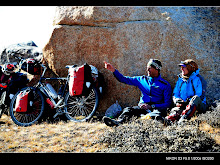The transition
Right on time we are out of the mountains: we have snow in the morning in Shangri-La. The narrow streets, lantarns and wooden houses give us a Christmas feeling. But it does not matter, from here we expect things to get warmer and easier, well?
In the cold rain we cycle south to the Tiger Leaping Gorge, an enourmous gorge in which the Yangtse river thunders. In two days we complete the hiking track on a high path above the gorge with a fantastic panorama. Then again we cross the gorge by bike on our way to the "Old Ferry".
After pushing and carrying our bikes on a small trail down we get to this smallest ferry to cross the Yangtse. Luckily, there's a horse on the other side to carry our bags up the bank.
The next day, when we have already been climbing on this steep muddy road for three hours, we discover to be in the wrong valley..It had to happen once! We are anxious to get to the right road, that one must be better. With a 40 km ascend on cobbles stones it is a bit better, but our progress remains slow. Exhausted we end up at a Naxi family's house. They have a spare room for us if we promise not to sleep in the same bed (we still look that energetic?)
On the way to Lijiang we leave the last snow capped mountains behind us. Lijiang is an old Naxi village with beautiful sites: small alleys, wooden houses, clear canals with goldfish swimming in it and old ladies selling corn on every streetcorner. In the morning the local ladies dance at the main square and at night we can see the (very) old man playing in an orchestra.
The cute little town is also ran down by rich Chinese tourists who party at night and vomit while standing on those beautiful small bridges. Poor goldfishes. Further south we can wear our shorts again as temperatures keep on rising. On the road to Dali we can see the first rice terrases. All of a sudden it changes fast: Instead of walnuts we eat coconuts, yaks change to waterbuffalos and we do not get to drink yakbutter tea anymore, now it is green tea.
To make the Chinese experience more intense we arrange Tai Chi lessons. At 7 in the morning we wait for our teacher in the dark, in his silk outfit he comes running with to Chinese students and calls: follow me! At a good pace we run up through the old town to the ancient city walls, where the sun is just rising above the mountains. Fully concentrated we try and copy the slow, graceful movements of Tai Chi. It is great to start the day like that and to stretch our legs differently.
In the middle of the forest we cheer as we pass 10.000 km's by bike! It appears to be a critical distance for some of our equipment since we experience the first real breakdowns. Both our cranks have a problem that needs fixing what makes us go 400km up and down to the next big city to get it repaired. One of our mattresses gets punched and a gearing outer cable gets broken. That part we did not take with us but we find an alternative solution: we put a splint on the cable with a used chopstick.
In the meantime our progress is still quite slow. We thought to have chosen a reasonable road south, but it changes suddenly to a cobble stone road to remain like that for three days. There is hardly other traffic (we understand why) and it is just us in the bush bush. Even Chinese tourists do not seem th get here and it is just us enjoying the views of the rice terraces. With incredible effort people work on the land, ploughing with their buffalos and planting the rice. It is not for nothing as we find the food here incredibly delicious.
Once we arrive to a bigger town (with asphalt) we are told that the road will get worse from here... There is not much we can do with this warning, it is the only way through. We still believe we have had the worst on the cobble stones. But mud, sand and stones do mean a worse road, while there is a lot of road construction going on. We proceed slowly and get very dirty but we are enjoying it. It seems like mountainbiking in the jungle and people passing on the motorbikes cheer at us.
Finally we go down through banana- and tea plantantions to the palm trees of Jinghong. The transition to South East Asia is almost complete. We will leave China in about a week and enter into Laos. What will that country have in mind for us?


No comments:
Post a Comment